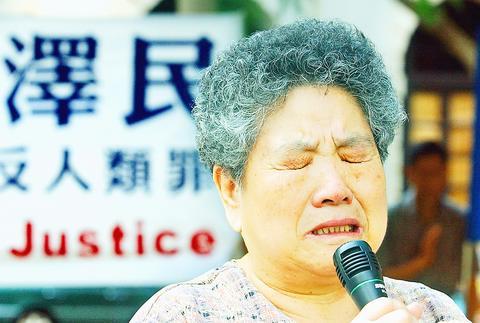When street demonstrations and mass telephone-call campaigns to protest Chinese government persecution fizzled, followers of the Falun Gong spiritual movement did what many aggrieved parties do: They sued -- in countries other than China.
Over the past 18 months, followers of the group banned by the Chinese government as an "evil cult" have filed at least a dozen suits in foreign courts against Chinese officials they accuse of rights abuses. Their biggest target: former president Jiang Zemin (江澤民).

PHOTO: AP
It's the latest tactic in an ongoing, high-profile campaign to draw attention to China's often brutal three-year-old crackdown on the group. If the object is to rile China's leaders, who are protected at home by the Communist Party's political monopoly, it seems to be working.
"They are stigmatizing the leaders of China with invented charges. They're trying to tarnish our government, and they are trying to grab attention for themselves," Chinese Foreign Ministry spokesman Kong Quan (孔泉) said this week.
Recent weeks have seen a flurry of new cases in Finland, Iceland, Belgium, France and Australia. The group says it has signed on high-profile lawyers such as British human rights attorney Geoffrey Robertson to represent them.
"The purpose of these cases is simple and specific: to target those responsible for the persecution. This is not a political campaign against the Chinese government," said Levi Browde, a Falun Gong spokesman in the US.
Virtually all Falun Gong activism these days comes from abroad; Chinese followers have gone into hiding. It is unclear how many people in China are Falun Gong practitioners.
The court cases apply foreign laws such as the US Alien Tort Claims Act to crimes committed in China -- the same principle under which, in 1998, a Spanish judge ordered former Chilean dictator Augusto Pinochet to face charges of crimes against humanity.
China is believed to be exerting considerable diplomatic pressure to have the suits dismissed. Yet even if the lawsuits fail, which is likely, Falun Gong may still be able to claim public-opinion points.
"It's a good strategy. Because if you win, or even if you don't, you can call attention to what you're doing and bring shame and blame against your opponent," said Michael Davis, a professor of law and government at Hong Kong's Chinese University.
The legal campaign scored an early success against a pair of lower-level Chinese officials when American judges ruled they didn't merit immunity and found them guilty of human rights abuses by default.
But a US federal judge in Chicago dismissed a case against Jiang on grounds that courts can exempt foreign leaders from civil lawsuits in the US if the government advises. The US government in that case filed a friend-of-the-court petition requesting dismissal, reportedly after China threatened a diplomatic rift.
Falun Gong's lawyer, Terry Marsh, says an appeal is being prepared.
"It is time for the people of China to learn that their government has lied to them ... that the Jiang regime has committed crimes of torture and genocide," Marsh said.
Falun Gong's legal teams have identified Jiang as their main target, saying that as president and Communist Party general secretary he was responsible for the crackdown. Other leaders being sued include Beijing party chief Liu Qi (

Indonesia and Malaysia have become the first countries to block Grok, the artificial intelligence (AI) chatbot developed by Elon Musk’s xAI, after authorities said it was being misused to generate sexually explicit and nonconsensual images. The moves reflect growing global concern over generative AI tools that can produce realistic images, sound and text, while existing safeguards fail to prevent their abuse. The Grok chatbot, which is accessed through Musk’s social media platform X, has been criticized for generating manipulated images, including depictions of women in bikinis or sexually explicit poses, as well as images involving children. Regulators in the two Southeast Asian

COMMUNIST ALIGNMENT: To Lam wants to combine party chief and state presidency roles, with the decision resting on the election of 200 new party delegates next week Communist Party of Vietnam General Secretary To Lam is seeking to combine his party role with the state presidency, officials said, in a move that would align Vietnam’s political structure more closely to China’s, where President Xi Jinping (習近平) heads the party and state. Next week about 1,600 delegates are to gather in Hanoi to commence a week-long communist party congress, held every five years to select new leaders and set policy goals for the single-party state. Lam, 68, bade for both top positions at a party meeting last month, seeking initial party approval ahead of the congress, three people briefed by

The Chinese Embassy in Manila yesterday said it has filed a diplomatic protest against a Philippine Coast Guard spokesman over a social media post that included cartoonish images of Chinese President Xi Jinping (習近平). Philippine Coast Guard spokesman Jay Tarriela and an embassy official had been trading barbs since last week over issues concerning the disputed South China Sea. The crucial waterway, which Beijing claims historic rights to despite an international ruling that its assertion has no legal basis, has been the site of repeated clashes between Chinese and Philippine vessels. Tarriela’s Facebook post on Wednesday included a photo of him giving a

ICE DISPUTE: The Trump administration has sought to paint Good as a ‘domestic terrorist,’ insisting that the agent who fatally shot her was acting in self-defense Thousands of demonstrators chanting the name of the woman killed by a US federal agent in Minneapolis, Minnesota, took to the city’s streets on Saturday, amid widespread anger at use of force in the immigration crackdown of US President Donald Trump. Organizers said more than 1,000 events were planned across the US under the slogan “ICE, Out for Good” — referring to the US Immigration and Customs Enforcement, which is drawing growing opposition over its execution of Trump’s effort at mass deportations. The slogan is also a reference to Renee Good, the 37-year-old mother shot dead on Wednesday in her